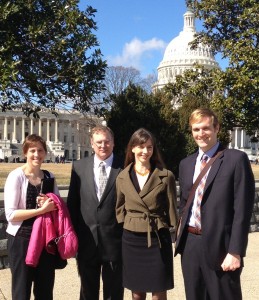19 March 2013
From seat 21B to the Hill: Scientists talk climate with Congress
Posted by mcadams

A team of scientists visiting members of Congress from Georgia and South Carolina stands outside the U.S. Capitol building on Climate Science Day, Feb. 27, 2013. From left are Jennifer Howard (NOAA), Robert Lund (Clemson University), Kim Cobb (Georgia Tech), and Erik Hankin (AGU). Photo courtesy of Kim Cobb.
As a paleoclimate scientist, I was thrilled to take part in the third annual Climate Science Day on Capitol Hill. The associated training was substantive and engaging and focused on helping us be heard through the din on the Hill. While my prior experiences with Hill visits have tempered my hopes for effecting lasting change, I believe that such conversations help put a face on climate science.
In my case, this conversation started in seat 21B of my flight to Washington, D. C., with Congressman Sanford Bishop (D-Ga.) in seat 21C and my 2-year-old daughter Sasha in seat 21A. One has to appreciate the irony here: I’m flying to D. C. to meet with a legion of congressional staffers in the faint hope that one of them may put my name under their boss’s nose for 2 seconds, and as it turns out, a real-life congressman is literally forced to sit down next to me for 2 hours. Our conversation started when I asked him for one of his napkins in response to the first of many spills. In the course of our initial small talk, he revealed that he was a congressman, and I silently cursed the pen holding up my hair and my disheveled, end-of-day-mom appearance.
We quickly realized we could have a substantive, if not uninterrupted, conversation, and we chatted for the rest of the flight. Sasha provided comic relief and spurred a sharing of stories about kids/grandkids (he has a 5-yearold granddaughter, and I have a 5-yearold daughter). He started with some probing questions about my thoughts on whether climate is best characterized as cyclical (no), whether the polar ice is really melting (yes), and to what extent Hurricane Sandy is related to climate change (it’s complicated).
We then meandered through a broader discussion about the energy landscape and the role for climate change in shaping energy policy. He spoke solemnly about how his vote for the Waxman-Markey cap-and-trade bill almost cost him his job. We ended up talking about the importance of broad-based energy education to train the next generation of leaders who can appreciate the complexity of the energy/climate landscape. I discussed my own Georgia Tech undergraduate energy course, in which students win a trip to visit Capitol Hill for winning the class “Carbon Reduction Challenge.” Congressman Bishop encouraged me to bring my students to his office this coming May and expressed an interest in meeting them personally. We then spent some time brainstorming about how to increase the number of energy-minded Georgia Tech students who intern on the Hill. At the end of the flight, he gave me his personal e-mail and cell number for follow-up. I’ve already gotten an e-mail from his chief of staff, and I’m looking forward to working with his office on issues related to energy and climate.
The formal Capitol Hill visits went as expected, for the most part. We joined a veritable sea of Hill visitors giving Congress their opinions about the looming sequester and budget fights. We had an edge in that we weren’t there to secure funding, which was a welcome break for the staffers we met with. Our main “ask,” to use Hill parlance, was to encourage the Congress members and their staffs to reach out to us with any requests for climate-related information. In my Georgia/South Carolina team, we each gave a brief blurb on our specialties and how they may relate to the broader issues facing our states. In most cases, the staffers thanked us for making the trip to visit them, listened intently, and promised to follow up if they had any questions. Unlike my previous visits to the Hill, this time we met only with Republicans, recognizing that conversations with climate scientists from their home states may be pivotal in shaping their views on climate science.
Reflecting on the experience, I sense the long-term benefit of discussing climate science findings in conversation with well-meaning individuals whose ideological leanings differ from my own. If the world moves forward one relationship at a time, then these cursory exchanges amount to something over the course of geologic time (i.e., several years in Capitol Hill time). Progress is measured slowly but steadily in a realm where human interactions and trust can trump scientific graphs. So I will go back to the Hill in May, with students high on energy efficiency, and again next February, for the fourth annual Climate Science Day on Capitol Hill, to once again share my expertise with an easy smile and an open mind.
—Kim Cobb, Earth and Atmospheric Sciences, Georgia Institute of Technology, Atlanta, Ga.
This post is also appearing in the March 19 issue of Eos: Cobb, K. (2013), A climate science day participant describes the experience, Eos Trans. AGU, 94(12), 116.


 The Plainspoken Scientist is the science communication blog of AGU’s Sharing Science program. With this blog, we wish to showcase creative and effective science communication via multiple mediums and modes.
The Plainspoken Scientist is the science communication blog of AGU’s Sharing Science program. With this blog, we wish to showcase creative and effective science communication via multiple mediums and modes.